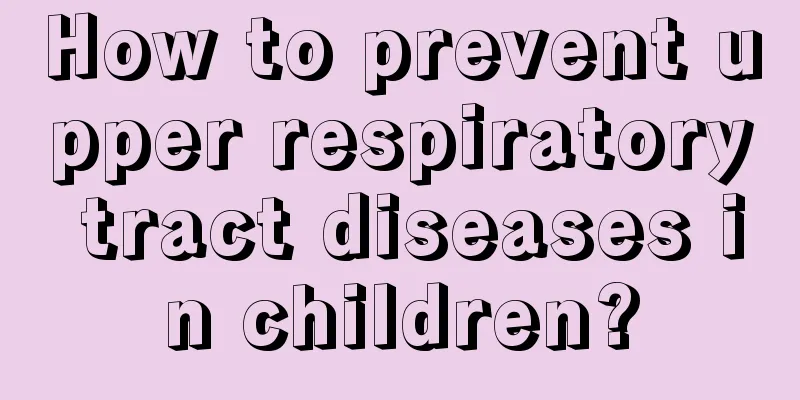How to prevent upper respiratory tract diseases in children?

|
As we all know, pediatric respiratory diseases include acute and chronic inflammation of the upper and lower respiratory tract, respiratory allergic diseases, pleural diseases, foreign bodies in the respiratory tract, congenital malformations and lung tumors. Among them, acute respiratory infection is the most common, accounting for more than 60% of pediatric outpatient visits, and the rate is even higher in the northern region. So how do you prevent upper respiratory tract diseases? Let’s take a closer look at it below. Prevention of upper respiratory tract diseases Mainly rely on strengthening physical exercise to enhance resistance; promote breastfeeding; prevent and treat rickets and malnutrition; avoid going to crowded public places. Nutritional conditioning Due to the long course of the disease, long-term coughing and sputum production will cause increased energy consumption and protein loss in patients with chronic respiratory diseases; gastrointestinal hypoxia and blood stasis can cause loss of appetite and indigestion; coupled with the gastrointestinal side effects of some drugs, they can all lead to physical weakness in patients. The vicious cycle of reduced nutrient intake - decreased absorption - increased consumption has the direct consequence of malnutrition, reduced immune function and increased chance of disease recurrence. It is recommended to formulate a reasonable nutritional diet and increase nutritional intake to alleviate and improve the patient's malnutrition condition. The dietary principle is to eat light and easy to digest food and avoid spicy and irritating food. Eating small meals frequently and mixing meat and vegetables can improve the absorption rate of nutrients. Food choices should mainly consist of low-fat, high-protein, vitamin-rich foods, such as lean meat, poultry, fish, milk, soy products, vegetables and fruits. Among seasonal fruits, pears and sugarcane have the effects of strengthening the spleen, benefiting the lungs, relieving cough and removing phlegm. Keep the air flowing According to weather changes, you should add or remove clothes in time to prevent catching cold, develop the habit of drinking more water, pay attention to personal hygiene, and wash your hands frequently. Keep rooms, offices and other places ventilated and maintain air circulation. When taking the bus, open windows appropriately for ventilation to keep the air fresh. Smoking is prohibited in public places and should also be avoided at home. Strengthen cold resistance training "Cover up in spring and keep cold in autumn" is a famous saying for disease prevention. It also shows that we need to exercise our cold resistance in autumn to prepare for winter. It is recommended to do some endurance sports that help improve cold resistance, such as long-distance running, climbing, cycling and other endurance sports, which can exercise cardiopulmonary function well. When exercising, you should ensure that the frequency of exercise is suitable for you, which can not only increase the body's immunity but also keep you in a happy mood. Keep warm In autumn, you must add or remove clothes in time, especially to keep the neck, head and back warm. Because these three places in the body are very susceptible to cold, and once they are caught in cold, the cold will directly enter the throat from the respiratory tract, and then into the lungs, causing a series of respiratory diseases, so keeping warm in autumn must be done well. The above is all about the prevention of upper respiratory tract diseases. Infants and young children are prone to this disease due to the anatomical and immune characteristics of the upper respiratory tract. Nutritional disorders, such as vitamin D deficiency rickets, subclinical vitamin A, zinc or iron deficiency, or improper care, climate change and adverse environmental factors, can easily lead to recurrent upper respiratory tract infections or prolong the course of the disease. At this time, you should go to the hospital to see a doctor in time. Give your baby a healthy body. |
<<: What should I do if my child has diarrhea after eating rice noodles?
>>: How to improve children's vision
Recommend
Height standards and nutritional supplements for infants and young children aged 0-3
The birth of a child is a great joy for a family,...
Can hernia in children heal on its own?
Some parents do not want to take their children f...
How to properly regulate children’s weak spleen and stomach?
Because parents are usually busy with work and ha...
My baby feels hot but doesn’t have a fever, what’s going on?
As we all know, the resistance of newborn babies ...
Does Chinese medicine work for children's cough patches?
The country has now clearly stipulated that it is...
Myopia in children
If your child tells you that he can't see obj...
What are the causes of psychogenic frequent urination?
Psychogenic frequent urination is a relatively in...
What to do if your child is willful
Children who are too willful are a problem that b...
What are the effects of noise on the fetus?
From a physiological point of view, noise is a so...
What should I do if my child suddenly develops red bumps on his body?
If a child develops red bumps on his body, it is ...
What medicine should be used for baby's scrotal eczema
In the process of taking care of babies, many mot...
What should children eat to grow taller during their growth period?
In order to make their children grow taller, many...
What medicine should children take to reduce internal heat? These prescriptions are invaluable!
The problem of children getting angry needs to at...
How many days after birth can babies swim? Swimming has many benefits for babies
The hospital will arrange for the baby to swim a ...
What are the preventive measures for infectious diseases in spring for young children?
With the arrival of spring, various infectious di...









